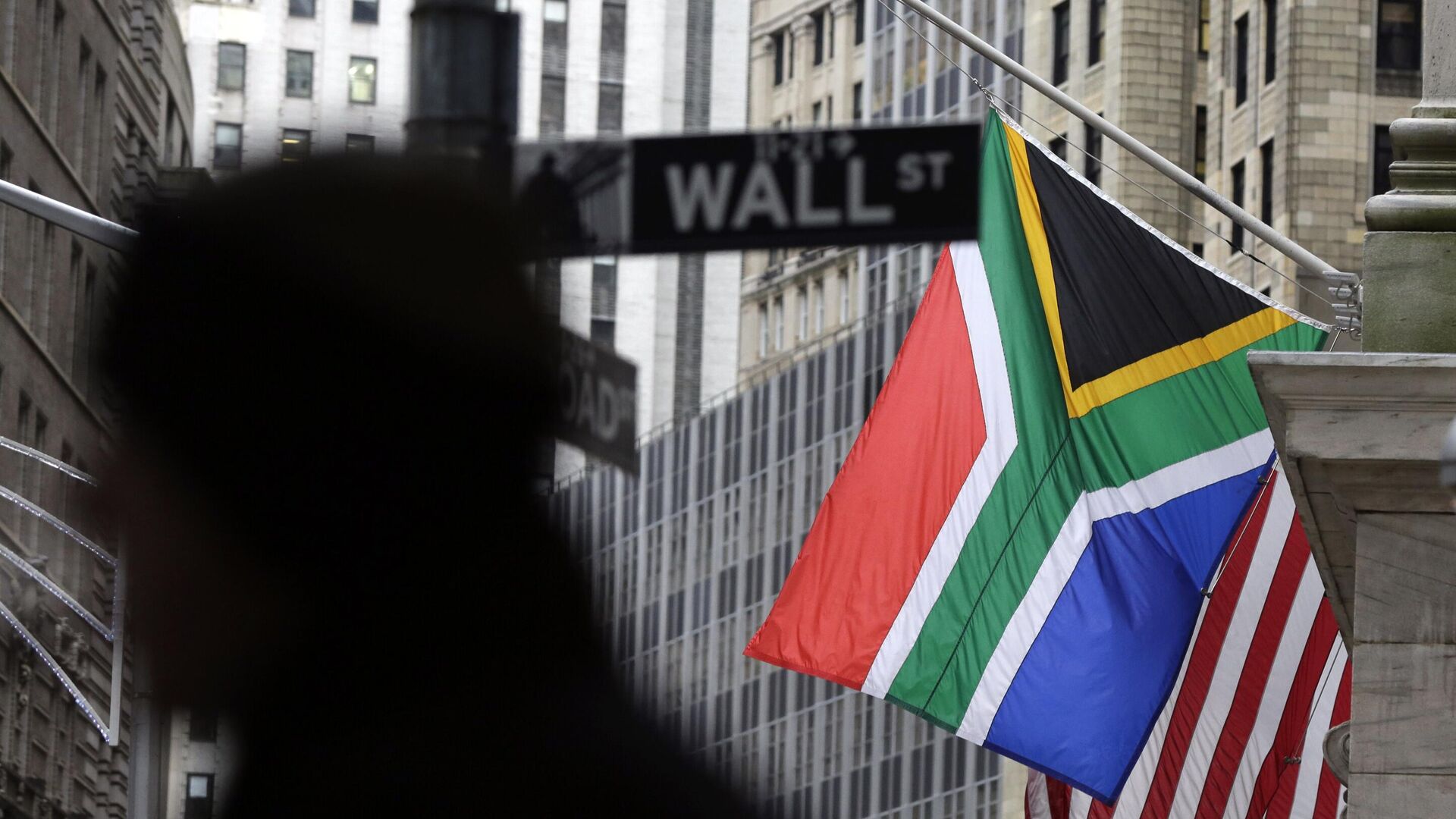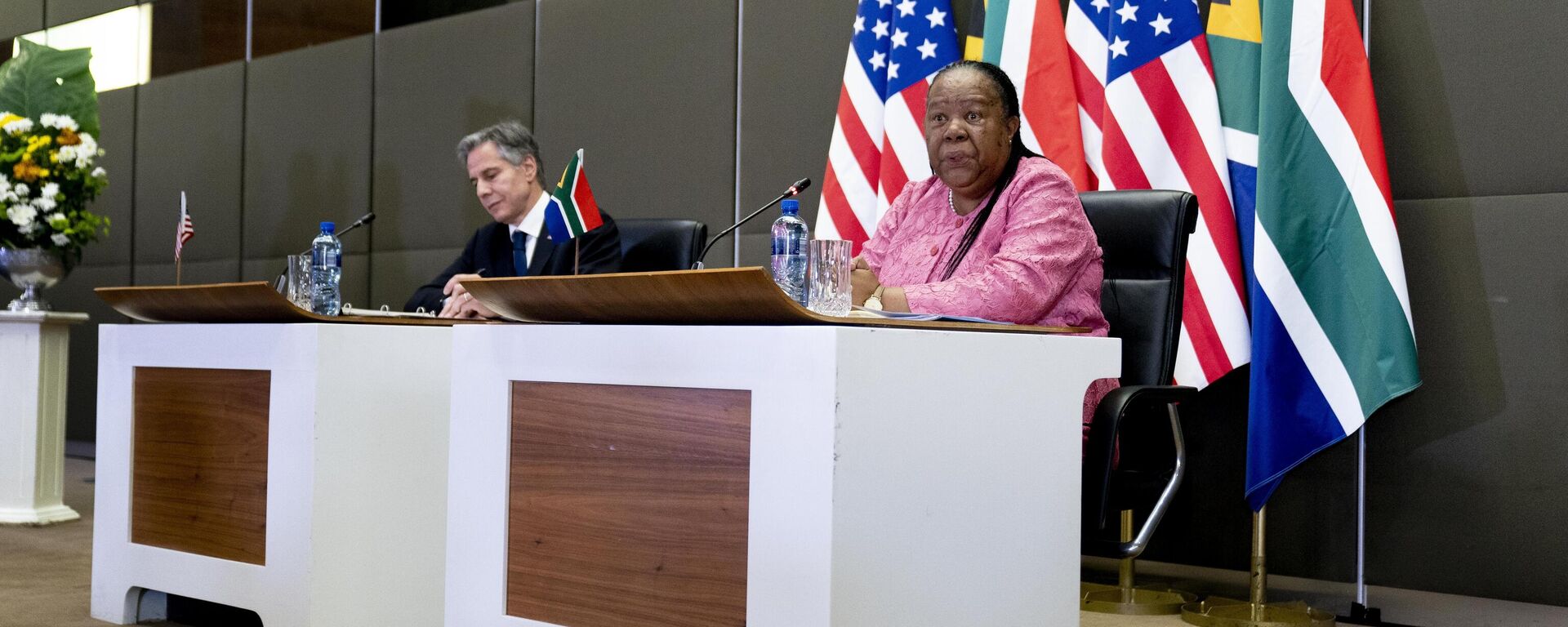https://en.sputniknews.africa/20240422/us-accusing-south-africa-of-aligning-with-malign-actors-is-a-form-of-colonization-analyst-says-1066181299.html
US Accusing South Africa of Aligning With 'Malign Actors' is a Form of Colonization, Analyst Says
US Accusing South Africa of Aligning With 'Malign Actors' is a Form of Colonization, Analyst Says
Sputnik Africa
A bill was recently introduced in the US Congress to review Washington's relationship with South Africa, which could also lead to Pretoria being cut off from... 22.04.2024, Sputnik Africa
2024-04-22T16:02+0200
2024-04-22T16:02+0200
2024-04-22T17:25+0200
opinion
russia-africa cooperation
nelson mandela
united states (us)
south africa
house of representatives
hamas
israeli-palestinian conflict
israel
palestine
https://cdn1.img.sputniknews.africa/img/07e8/04/16/1066182977_0:0:2890:1626_1920x0_80_0_0_dc853031e69e52a42b2e94fc779bcc54.jpg
The allegations raised by the bill, which originated in the US House of Representatives and is known as the "US-South Africa Bilateral Relations Review Act," focus on positions taken by the South African government that are seen as aligned with countries that have a history of direct or indirect confrontation with the US.The implications of the bill extend not only to Pretoria, but also to other African states such as Burkina Faso, Mali, and Niger.What is happening now — and has already happened in other nations, such as Burkina Faso — reinforces the colonization of African states, Carolina Vasconcelos, a researcher at the Conjuncture Assessment Center (NAC) for the Sub-Saharan Africa region, told Sputnik, commenting on the US bill.Amid sub-Saharan Africa's rapprochement with Moscow, the US is increasingly distancing itself from the continent, she said. In addition to Russia, the bill specifically mentions the Palestinian group Hamas, the Iranian government, and China as "areas of concern," the analyst added.The researcher said that Washington could cut subsidies and trade partnerships as a way to weaken African countries. The biggest concern, she said, is the African Growth and Opportunity Act (AGOA), a trade agreement that allows eligible African countries to export some of their products to the US without paying tariffs.If the US pulls South Africa out of the deal, it could have serious consequences for Pretoria that could take decades to resolve, even though Beijing could become South Africa's largest economic partner, Vasconcelos pointed out.According to José Ricardo Araujo, a researcher at the Conjuncture Assessment Center for the Sub-Saharan Africa region of the Naval War School, the Sahel region, which includes Mali, Niger, and Burkina Faso, has been particularly targeted due to recent coups.Such events have led Washington to question the "democratic legitimacy" of these countries and to advocate sanctions and cuts in diplomatic relations, he said.South Africa-Palestine RelationsThe US congressional bill also emphasizes the rapprochement between South Africa and Iran, with meetings between the countries' authorities amidst the conflict in the Gaza Strip. The document also highlights Pretoria's appeal to the ICJ regarding Israel's accusation of genocide, which also displeased the US.In this regard, Vasconcelos noted that the anti-apartheid movement was initially considered "terrorist" in South Africa and that former President Nelson Mandela maintained good relations with the Palestine Liberation Organization.In terms of giving advice to the South African government, Araujo suggested a cautious approach, recognizing the importance of maintaining relations with the US, but also advocating for the defense of South Africa's strategic interests and priorities.In addition, the bill highlights the intersection of political, economic, and religious issues in Africa. The accusation that African countries are aligned with "malign actors" has implications not only for political stability, but also for trade relations and regional security, the expert believes.
https://en.sputniknews.africa/20240212/what-are-implications-of-us-threat-to-cut-south-africa-off-from-agoa-sa-professor-answers-1065047065.html
united states (us)
south africa
israel
palestine
pretoria
Sputnik Africa
feedback@sputniknews.com
+74956456601
MIA „Rossiya Segodnya“
2024
Maxim Grishenkin
https://cdn1.img.sputniknews.africa/img/07e7/0a/17/1063018107_0:0:1104:1103_100x100_80_0_0_03090c85a11f5d2e8a19cf1d989443c9.jpg
Maxim Grishenkin
https://cdn1.img.sputniknews.africa/img/07e7/0a/17/1063018107_0:0:1104:1103_100x100_80_0_0_03090c85a11f5d2e8a19cf1d989443c9.jpg
News
en_EN
Sputnik Africa
feedback@sputniknews.com
+74956456601
MIA „Rossiya Segodnya“
Sputnik Africa
feedback@sputniknews.com
+74956456601
MIA „Rossiya Segodnya“
Maxim Grishenkin
https://cdn1.img.sputniknews.africa/img/07e7/0a/17/1063018107_0:0:1104:1103_100x100_80_0_0_03090c85a11f5d2e8a19cf1d989443c9.jpg
russia-africa cooperation, nelson mandela, united states (us), south africa, house of representatives, hamas, israeli-palestinian conflict, israel, palestine, african growth and opportunity act (agoa), africa insight, pretoria
russia-africa cooperation, nelson mandela, united states (us), south africa, house of representatives, hamas, israeli-palestinian conflict, israel, palestine, african growth and opportunity act (agoa), africa insight, pretoria
US Accusing South Africa of Aligning With 'Malign Actors' is a Form of Colonization, Analyst Says
16:02 22.04.2024 (Updated: 17:25 22.04.2024) A bill was recently introduced in the US Congress to review Washington's relationship with South Africa, which could also lead to Pretoria being cut off from the African Growth and Opportunity Act preferential trade program. The bill accuses Pretoria of strengthening ties with alleged "malign actors," including Russia, China and Palestinian Hamas.
The allegations raised by the bill, which originated in the US House of Representatives and is known as the "US-South Africa Bilateral Relations Review Act," focus on positions taken by the South African government that are seen as aligned with countries that have a history of direct or indirect confrontation with the US.
The implications of the bill extend not only to Pretoria, but also to other African states such as Burkina Faso, Mali, and Niger.
What is happening now — and has already happened in other nations, such as Burkina Faso — reinforces the colonization of African states, Carolina Vasconcelos, a researcher at the Conjuncture Assessment Center (NAC) for the Sub-Saharan Africa region, told Sputnik, commenting on the US bill.
Amid sub-Saharan Africa's rapprochement
with Moscow, the US is increasingly distancing itself from the continent, she said. In addition to Russia, the bill specifically mentions the Palestinian group Hamas, the Iranian government, and China as "areas of concern," the analyst added.
"Russia's preponderance in several countries, in the economic, military, political and ideological spheres, directly influences the US, which is already planning laws to prevent the extension of these partnerships, which they consider to be evil and against American interests," Vasconcelos noted.
The researcher said that Washington could cut subsidies and trade partnerships as a way to weaken African countries. The biggest concern, she said, is the African Growth and Opportunity Act (AGOA), a trade agreement that allows eligible African countries to export some of their products to the US without paying tariffs.
If the US pulls South Africa out of the deal, it could
have serious consequences for Pretoria that could take decades to resolve, even though Beijing could become South Africa's largest economic partner, Vasconcelos pointed out.
"AGOA has already been withdrawn from several southern African countries because, according to the US, it was against them or was not becoming 'democratic enough.' It is a euphemism, of 'not doing what I want'," the expert stressed. "Ethiopia, Mali, and Guinea were expelled in 2021. New expulsions have been announced in 2023, including the Central African Republic, Uganda and Gabon."
According to José Ricardo Araujo, a researcher at the Conjuncture Assessment Center for the Sub-Saharan Africa region of the Naval War School, the Sahel region, which includes Mali, Niger, and Burkina Faso, has been particularly targeted due to recent coups.
Such events have led Washington to question the "democratic legitimacy" of these countries and to advocate sanctions and cuts in diplomatic relations, he said.
South Africa-Palestine Relations
The US congressional bill also emphasizes the rapprochement between South Africa and Iran, with meetings between the countries' authorities amidst the conflict in the Gaza Strip. The document also highlights Pretoria's
appeal to the ICJ regarding Israel's accusation of genocide, which also displeased the US.
In this regard, Vasconcelos noted that the anti-apartheid movement was initially considered "terrorist" in South Africa and that former President Nelson Mandela maintained good relations with the Palestine Liberation Organization.
"The issue of Palestine is fundamental to South Africa's foreign policy, dating back to the era of Nelson Mandela. South Africa has taken a firm stance on Palestine, seeing it as an important cause for freedom and justice. This, in turn, has been interpreted by the US as an inconsistency in South African diplomacy," said another expert, Araujo.
In terms of giving advice to the South African government, Araujo suggested a cautious approach, recognizing the importance of maintaining relations with the US, but also advocating for the defense of South Africa's strategic interests and priorities.
In addition, the bill highlights the intersection of political, economic, and religious issues in Africa. The accusation that African countries are aligned with "malign actors" has implications not only for political stability, but also for trade relations and regional security, the expert believes.
"African countries have sought alternatives to mitigate the impact of sanctions, seeking support from other powers such as China and Russia. However, this raises questions about the geopolitical and economic influence of these countries on the African continent," he concluded.



